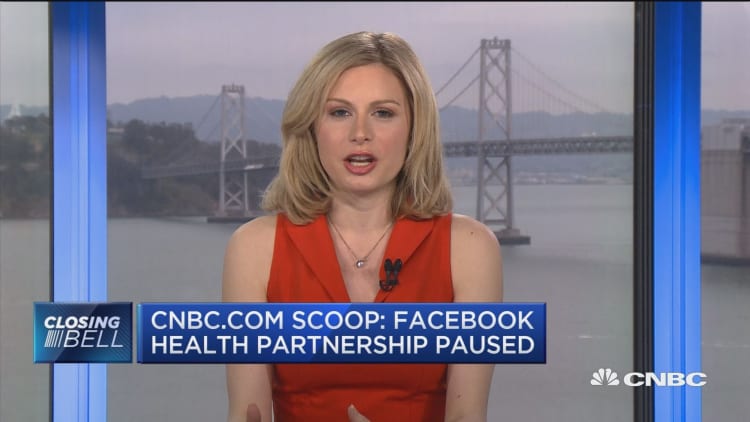When NYU's doctors had an idea to speed up the process of MRI scans, they thought of one technology company to help them out: Facebook.
Yes, that Facebook. The social networking company.
The two institutions announced this week that they're working together on a research project that aims to make MRI imaging scans up to 10 times faster. Today, it takes about 15 minutes to an hour to take an MRI, while X-rays or CT scans take less than a minute.
To solve this problem, computer engineers at Facebook plan to use neural networks, a computing methodology inspired by the way neurons work together in the human brain, to recognize the structure of the imaging and automatically fill in views that were previously omitted in order to speed up the scan. That all needs to be done while maintaining accuracy, as a mistake could be potentially fatal for patients.
"A few missing or incorrectly modeled pixels could mean the difference between an all -clear scan and one in which radiologists find a torn ligament or a possible tumor," a blog post reads.
It's an ambitious effort that could have a huge payoff on both sides, while reducing medical costs and improving the patient experience. A win-win.
But why Facebook?
Why Facebook?
Here's what I think:
Solving big-world problems helps retain talent. Facebook, like the other large technology players, can afford to staff its engineering team with machine learning experts that few other companies can afford. But those people will probably want to do more than help optimize engagement to maximize advertising revenue — they'll want to work on hard problems that could help a lot of people and potentially even save lives. This project would fit the bill. So talent retention is probably part of the reason.
It's a huge market with untapped opportunities for companies that understand data. The health sector is worth about $3 trillion, and the traditional tech companies still don't have much presence there, despite years of effort. There are huge business opportunities in developing algorithms that can determine physician quality, patient outcomes, speed up routine tests, make predictions about those that are likely to get sick, and so on. This information was previously trapped in hospital servers. Now it's starting to be used for research, and ultimately could be used commercial products.
We know that Facebook in the past few years has hired a few health experts to approach hospitals to work on medical applications, which involve sharing de-identified data. But I believe we'll see every tech company from Alphabet to Amazon, as well as the smaller start-ups, find ways to access these datasets.
Facebook has a lot of experience with images. Thanks to its longstanding focus on photo sharing, Facebook has the right mix of experts on its staff to work with imaging data.
Think about its expertise in photos, where it can almost immediately figure out who should be tagged among countless potential options.
Imaging data is a particularly attractive subset of medical data, too. Radiologists are used to incorporating computers into their work, and they are overloaded with piles of imaging data that they don't have time to analyze. NYU alone does two million imaging exams per year, according to Daniel Sodickson, NYU's vice chair for research in radiology. Hospitals across the world could benefit from tools that could speed up and bring new efficiency to this process, and would be willing to pay for it.
Can we trust Facebook with our data?
Medical information is a particularly sensitive data type for most of us. It's a terrifying prospect to imagine advertisers or other third parties using that information without consent.
Both Facebook and NYU stressed in an interview with me that the project was purely for research, and it isn't tied to financial goals. The companies are also making sure that the data is de-identified so it isn't tied to a specific individual.
"Any labels associated with raw image data have been stripped," stressed Facebook's AI research manager Larry Zitnick. Facebook plans to make the code available to other institutions so the results could be quickly replicated by the broader medical research community, Zitnick says.
From NYU's standpoint, the research project was vetted by an institutional review board to ensure it's in line with ethics standards.
But what happens after the research is completed?
If it works, then NYU and other institutions will likely look for ways to implement the new technology into clinical care. That could be a business opportunity for Facebook and other tech players in the long run. Although it's possible that Facebook will remain purely in the research realm as it grapples with concerns about privacy in other aspects of its business.
Facebook won't be the only big tech player bringing health care into the digital age. And at that point, society will have to figure out how much we can trust the tech giants, and how to balance privacy concerns against the utility of the advances they enable.
"We take a long-term perspective on the research we do," said Sodickson. "We don't just publish a paper and then run away," he added. "We are going to be useful."
Correction: MRIs do not expose patients to radiation.



